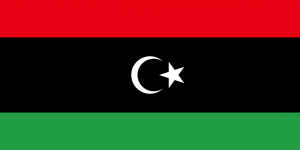Language/Libyan-arabic/Culture/Libya-Timeline
< Language | Libyan-arabic | Culture
Jump to navigation
Jump to search
Rate this lesson:
Historical Timeline for Libya - A chronology of key events
Libya Timeline[edit | edit source]
Greek and Punic Libya[edit | edit source] | |
| 9th century BC. AD | establishment of seasonal Phoenician merchant stops on the Tripolitan coast. |
| 5th century BC. | The commercial stops of the Phoenician merchants, Uiat (future Oea then Tripoli), Lebda (future Leptis Magna) and Sabratha become important Punic or emporia counters under the domination of Carthage. |
| 631 BC AD | foundation of Cyrene by the Greeks. |
Roman and Byzantine Libya[edit | edit source] | |
| 106 BC AD | the Romans gain a foothold in Tripolitania. |
| 96 BC AD | Cyrenaica of the Lagid kings (Egyptians) is ceded to the Romans. |
| 74 BC AD | Cyrenaica becomes a province of the Roman Empire. |
| 27 BC AD | the Tripolitan emporia are integrated into the Roman province of Africa Nova. |
| 20 BC AD | Emperor Augustus attaches the province of Cyrenaica to Crete. |
| 19 BC AD | Roman expedition led by Cornelius Balbus in Fezzan to rally the tribe of Garamantes. |
| 1st century AD AD | Leptis Magna, Sabratha and Oea obtain the status of Roman colonies. |
| 115-117 | the great Jewish riot from Egypt to Mesopotamia spreads in Cyrenaica; Cyrene is devastated. |
| 300 | administrative reorganization of the Roman Empire by Emperor Diocletian. Cyrenaica is divided into two provinces attached to the Eastern Empire. |
| 455 | invasion of the Vandals. |
| 535 | the Byzantine general Bélisaire drives out the Vandals. |
Arab conquest[edit | edit source] | |
| 642-643 | Arab conquest of Libya led by Amr ibn al-Ass. |
| 7th-8th century | domination of the Aghlabid emirs in Tripolitania. |
| 910-911 | Tripolitania under the control of the Fatimid dynasty. |
| 11th century | the Arab tribes of Banou Hilal and Banou Souleïm settle in Libya. |
| 1146 | invasion of Tripoli by the Normans of Sicily. |
| 12th century | Tripoli becomes one of the main bases for piracy in the Mediterranean. |
| 13th century | conquest of Libya by the Hafsid dynasty. |
| 1510 | the Spaniards seize Tripoli. |
Ottoman Libya[edit | edit source] | |
| 1551 | Tripolitania is incorporated as a province in the Ottoman Empire. |
| 1639 | the dey of Tripoli occupies Benghazi. |
| 1711 | Qaramanli dynasty installed in Tripoli. The trade in black slaves brought by caravan routes flourished. |
| 1835 | end of the Qaramanli dynasty, Tripoli is again administered by a direct representative of the Ottoman Empire. |
| 1843 | first zawiya of the brotherhood of Sanoussiya in Al-Bayda in Cyrenaica. |
Italian colonization[edit | edit source] | |
| 1911-1912 | Italo-Turkish war, start of Italian colonization. |
| 1912-1932 | Italo-Libyan war against a background of Italian colonization. The brotherhood of Sanoussiya becomes the spearhead of the fight against the Italians. |
| 1931 | September 16, Omar Moukhtar, member of the Sanoussiya and hero of the fight against the Italians, is hanged in Solouk. |
| 1931-1932 | the "pacification" of the country by the Italians is completed with the rout of the Sanoussiya fighters. |
World War II and Independence[edit | edit source] | |
| 1942 | from June 2 to 10, siege of Bir Hakeim, fierce resistance of the Free French Forces against the German offensive. On October 23, the Battle of El-Alamein (Egypt) begins. |
| 1943 | defeat of the Axis forces, Libya under the mandate of France (in Fezzan) and England (in Tripolitania and Cyrenaica). |
| 1947 | Italy officially renounces all its claims on Libya and more generally all its possessions in Africa. |
| 1949 | March 1, declaration of independence of Cyrenaica by Emir Idriss el-Sénoussi, grandson of the founder of the religious brotherhood of Sanoussiya. On November 21, a United Nations resolution adopted the principle of Libya's independence. |
The royalty[edit | edit source] | |
| October 7, 1951 | adoption of the Constitution of the United Kingdom of Libya, federal in nature. |
| December 24, 1951 | proclamation of independence of Libya by Emir Idriss, who became King Idriss I. |
| December 7, 1953 | Great Britain is authorized to keep its military bases in Libya. |
| 1959 | discovery of the first large oil field. |
| April 15, 1963 | replacement of the federal regime by a unitary state. |
| May 27, 1963 | the king banned political parties. |
| 1964 | voting rights granted to women. Student strikes inspired by Nasserism are repressed. |
| 1965 | the city of Al-Bayda in Cyrenaica becomes the capital of the Kingdom. |
| June 5, 1967 | Six-Day War. Large anti-Zionist, anti-Western and anti-Jewish demonstrations in Libya. |
Gaddafi's Libya[edit | edit source] | |
| September 1, 1969 | overthrow of the monarchy of King Idriss I by a coup d'état carried out on the night of August 31 by a group of Libyan officers, the Free Unionist Officers. Constituted as a Revolutionary Command Council headed by Colonel Moammar Kadhafi, they proclaimed |
| March 28, 1970 | evacuation of the last British military forces. |
| June 11, 1970 | evacuation of the last American military forces. |
| June 12, 1971 | creation of the Arab Socialist Union party (USA). |
| May 30, 1972 | USA proclaimed single party. |
| April 15, 1973 | speech by Zouara - Gaddafi announces the start of the People's Revolution. Through popular committees, the people are invited to storm all levels of the administrative apparatus and to arm themselves (slogan of "people in arms"). |
| 1975 | the USA is abolished, political parties are banned in accordance with the Green Book, the three volumes of which written by Gaddafi appeared between 1975 and 1979. |
| 1977 | March 2, the General People's Congress proclaims the "establishment of people's power". Birth of the Jamahiriya (State of the masses). November 2, creation of revolutionary committees. |
| 1986 | American raid on Benghazi and Tripoli (April 15) and United States embargo on Libya. |
| 1987 | faced with the current economic crisis, a policy of economic openness (infitah) is decreed which results in the disengagement of the State in several sectors. |
| 1988 | December 21, the Pan Am Boeing bombing over Lokerbie kills 270. |
| 1989 | September 19, the attack on a UTA DC-10 in Niger kills 170. |
| 1992 | March 31, UN embargo through the adoption of Security Council resolution 748. |
| 1999 | September 9, birth of the African Union project in Sirte. In April, suspension of the UN embargo on Libya. |
| 2001 | in January, trial of two Libyans suspected in the Lokerbie attack at the Hague court. |
| 2003 | in September, lifting of the UN embargo. In December, Tripoli renounced its weapons of mass destruction program. |
| 2004 | April 23, lifting of the American embargo on Libya. |
| 2006 | on May 15, US Secretary of State Condoleeza Rice announces the upcoming opening of an American embassy in Tripoli. |
| 2007 | release of the five Bulgarian nurses and the Palestinian doctor after eight years of detention in Libya. |
Source[edit | edit source]
- https://fr.wikipedia.org/
- https://www.petitfute.com/p69-libye/guide-touristique/c55335-histoire.html
World Timelines[edit source]


